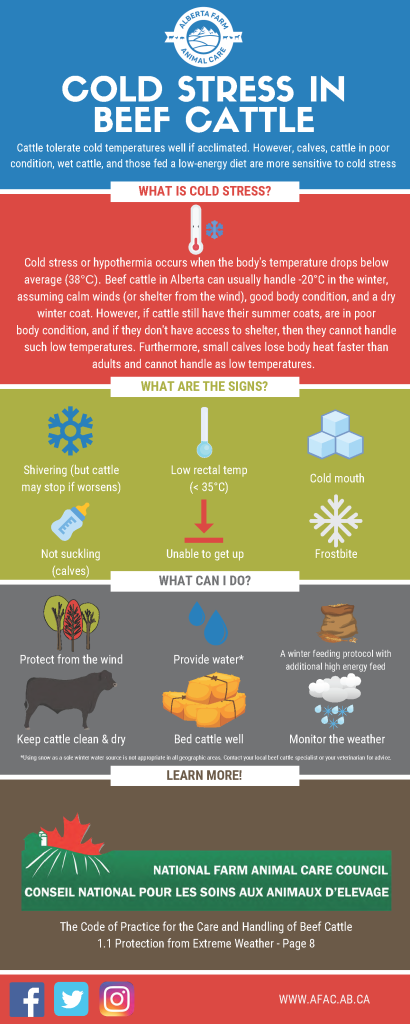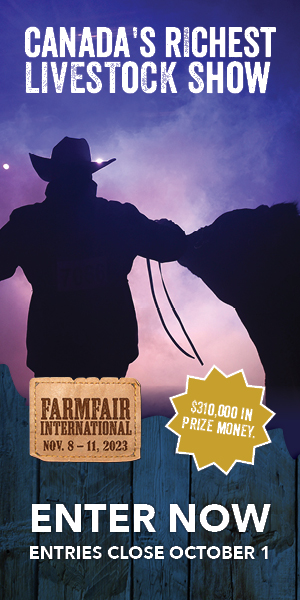AB Direct - Steers
Rail: ---
AB Direct - Heifers
Rail: ---
US Trade- Steers
Rail: 290.00 (IA)
US Trade - Heifers
Rail: 290.00 (IA)
Canadian Dollar
0.02
Cold stress: how much does it impact your operation’s bottom line?
What is cold stress?
All mammals must maintain their internal body temperatures, with cattle averaging 38°C. Their body becomes stressed when environmental temperatures drop below the lower limit of the thermoneutral zone, the ‘lower critical temperature.’ Top factors that contribute to cold stress are cold weather, wind, wet weather, and lack of feed.
Estimates of lower critical temperatures for beef cattle in different seasons*
| Season | Lower Critical Temperature |
|---|---|
| Summer | 15°C |
| Fall | 7°C |
| Early winter | 0°C |
| Late winter | -8°C |
Cattle will grow a winter coat to help them throughout the winter. Still, they need to increase their metabolic rate. If they cannot maintain their body temperature, they will experience hypothermia. If severe enough, they will need medical intervention – a cost to the producer.
Animals with good fat coverage will have an easier time withstanding cold temperatures. Animals with little fat cover, such as very young, old, and sick animals, are more susceptible to cold stress. Therefore, it is recommended that cattle going into winter have good body condition (i.e., 3 out of 5).
What are the short-term financial impacts of cold stress?

The apparent financial impact of cold stress on your operation is the cost of feeding to meet cattle’s increased energy demand. Cattle with poor body condition will need more feed to compensate for their lack of insulation. Bred heifers and second calvers will need even more feed.
It is estimated that a cow’s energy intake must increase by 1 per cent for every degree below the lower critical temperature. This demand increases if conditions are wetter and if the winter coat is compromised due to moisture, mud, feces, etc.
Unfortunately, animals experiencing cold stress will often have a decreased appetite, which causes them to lose more condition. A nasty cycle!
Like other stressors, cold stress impacts the immune system. Therefore, animals experiencing cold stress have a higher risk of illness, which is associated with increased medical and labour costs.
What are the longer-term financial impacts of cold stress?
Some producers may choose to not increase their cattle’s feed with the intention of them gaining weight in the spring. In the short run, this would appear to save money. But in the long-term, it may cost more.
Cows with poor body condition are more likely to produce lower quality colostrum and less milk. As a result, their calves are at higher risk of being born weak, getting ill, and having a lower weaning weight. These risks increase the operation’s labour and medical costs and reduce its profit.
Where can you find more information?
ALERT Line – for questions or concerns about animal welfare, including if you need support, call: 1-800-506-2273
AFAC Website – information for livestock species raised in Alberta.
Agricultural Fieldman – develop, implement, and control programs set out by the Agricultural Service Board.
This article was first published in Volume 2 Issue 5 of ABP Magazine (December 2022). Watch for more digital content from the magazine on ABP Daily.
Leave a Comment
Add abpdaily.com to your home screen
Tap the menu button next to the address bar or at the bottom of your browser.
Select ‘Install’ or ‘Add to Homescreen’ to stay connected.



Share this article on
About the Author
Dr. Melissa Moggy is an Extension Coordinator and Research Assistant at Alberta Farm Animal Care (AFAC). She received her Doctor of Veterinary Medicine at the University of Prince Edward Island, and her MSc in Veterinary Medicine at the University of Calgary.